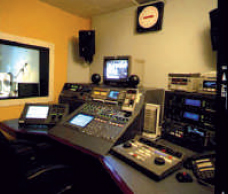|
CSA’s Key 2009 Dates
12 January.
On its web site, the Conseil publishes a Charter relating to minors’ participation in TV shows. Its adoption supplements the Conseil’s deliberation of 17 April 2007 relating to minors participating in TV shows.
20 January.
A call for tenders for the edition of a local channel in Martinique is issued.
24 January.
The terms of office of Christian Dutoit, Élisabeth Flüry- Hérard, and Agnès Vincent-Deray having expired, three new conseillers (board members) are appointed under a décret by the President of the Republic: Françoise Laborde, designated by the President of the Republic, Emmanuel Gabla, designated by the Speaker of the Assemblée nationale, and Christine Kelly, designated by the Speaker of the Sénat.

3 February.
The 20th anniversary of the CSA is celebrated at Pavillon Gabriel in Paris. The President of the Republic, Ms. Christine Albanel, Minister for Culture and Communication, and Ms. Nathalie Kosciusko-Morizet, secrétaire d’État in charge of forward planning and the digital economy, attended, together with three former Conseil chairs – MM. Jacques Boutet, Hervé Bourges, and Dominique Baudis – and numerous representatives of the broadcasting industry.
4 February.
First digital switch-over experiment in Coulommiers (Seine-et-Marne). Groupement d’intérêt public France Télé numérique, a special purpose body set up in order to inform and help viewers go through this technological revolution, deemed the outcome of the pilot project to be satisfactory.
10 February.
A study on music programmes on free-to-air broadcasting is published as an outcome of the mission Musique (music task force) chaired by Michèle Reiser: with the arrival of DTT, music programmes show are larger increase than any other programmes.
The Conseil issues a call for tender for six baromètres (indices) to measure diversity on television from 2009 to 2011.
18 February.
Jointly with the Minister for Health and Sports, and the Minister for Culture and Communication, Michel Boyon signs a Charter to promote a healthy diet and physical exercise in television programmes and television advertising.
28 February.
DTT coverage is extended to 36 additional areas, most of which are in French départements that were amongst the least covered.

3 March.
A call for tenders for radio is issued in the geographical jurisdiction of the comité technique radiophonique (CTR) (radio technical committee) of Dijon.
5 March.
Enactment of the law relating to audiovisual communication and the new public television service.
17 March.
Issuance by the Conseil to the Autorité de la concurrence (competition authority), of its opinion relating to exclusive relationships between the work of electronic communication operators, and distribution of contents and services. The opinion deals, in particular, with the exclusive distribution of the channels edited by Orange.
20 March.
The Observatoire de la diversité (observatory for diversity), chaired by Rachid Arhab, welcomes the heads of thirteen journalism schools to find out about policies to promote diversity implemented by the schools.
24 March.
Adoption of the recommendation relating to the European Parliamentary elections on 7 June. On 21 April, the Conseil adds provisions relating to the broadcasting of comments by the President of the Republic.
25 March.
The Conseil issues a report on the outcome of its actions to make programmes accessible to persons with a hearing or visual disability to the Conseil national consultatif des personnes handicapées (national consultative committee of persons with disabilities).
The Observatoire de l’équipement des foyers pour la réception de la télévision numérique (observatory of households’ equipment to receive digital television), chaired by Alain Méar, publishes the results of its half-year baromètre (index): more than 35% of households in mainland France have a DTT adapter.
27 March.
Upon proposal by Sylvie Genevoix and Marie-Laure Denis, respectively chair, and deputy chair, of the Local TV working group, the Conseil takes several steps to support the development of local televisions: public consultations in several regions, calls for tenders, softening of certain rules, and synergy building between editors.

 7 April. 7 April.
Appointement of Mr. Jacques Martial and Ms. Patricia Langrand to the board of directors of France Télévisions, and of Ms. Hélène Fatou to the board of directors of Radio France.
Public hearing of Mr. Jean-Luc Hees, proposed by the French Government as chairman of Radio France. The next day, the Conseil issues a favourable opinion to the appointment.
The CSA issues the Autorité de régulation des communications électroniques et des postes (ARCEP) (electronic communications and posts regulatory authority) with an opinion on the off-air digital broadcasting wholesale market.
New local channels in the Lille area are issued with a license: Wéo and Grand Lille TV.
21 April.
Several appointments to the board of directors of company Audiovisuel extérieur de la France are made by the Conseil: Mr. Francis Balle, Ms. Soumia Belaidi Malinbaum, Ms. Hélène Carrère d’Encausse, Mr. Greg Germain, and M. Hubert Védrine. The Conseil sets forth the conditions in which channels may make two advertising breaks during audiovisual or cinema works.
30 April.
42 additional areas start receiving DTT.

4 May.
Christine Kelly chairs a meeting with broadcasters, organized by the CSA, to define the broadcasting conditions for public health announcements relating to the swine flu.
7 and 8 May.
29th meeting of the European Platform of Regulatory Authorities (EPRA) in Tallinn (Estonia), attended by Emmanuel Gabla.
13 May.
The Observatoire de la diversité musicale à la télévision (observatory of music diversity on television) is set up by the Conseil. Co-financed by the CSA and the Cité de la musique, its purpose is to review music presence and diversity on 14 television channels.
19 May.
Images Plus, a local channel in Épinal and Vittel is issued with a license.
Calls for tenders are issued in Champagne- Ardenne, Languedoc-Roussillon and in the Rodez area.
Calls for tenders for local televisions are issued in La Rochelle and Argenton-sur-Creuse.
26 May.
The first digital radio operators in the Paris, Marseille, and Nice regions are selected. Rachid Arhab, chair of the Digital radio working group, announces the upcoming opening of a public consultation regarding the launch of digital radio in the whole country.
The Conseil issues an opinion on the cahier des charges (specifications) of France Télévisions.
29 May.
The CSA welcomes a delegation from the Conseil supérieur de l’audiovisuel de la Communauté française de Belgique.
31 May.
DTT starts broadcasting to 24 additional areas.

3 June.
Opening of a public consultation on the issuance of a call for tenders for the edition of local television channels in Boulogne/Dunkerque, Rouen/Neufchâtel-en-Bray, Alençon, Cherbourg, and Laval.
Adoption of a deliberation extending, as from 8 June, the period during which the rule to compute air time given to the President of the Republic and persons working with him will apply; the rule had initially been set forth in relation to the campaign for European Parliamentary elections.
Local channel Demain Sud Bretagne is issued with a license in Lorient and Vannes.
9 June.
Marie-Laure Denis takes stock of the electoral campaign for the European parliamentary elections: a significant increase of air-time devoted to electoral news is shown.
Local channel TV Sud 77 is issued with a license in Meaux.
10 June.
To deepen its relationship with the public, the Conseil organizes its first meeting with consumer associations. The meeting is chaired by Michel Boyon, and conducted by Christine Kelly and Emmanuel Gabla, respectively chair, and deputy-chair of the Advertising and Consumer Protection working group.
15 June.
The Observatoire de la diversité (observatory for diversity) welcomes representatives of creative branches of the audiovisual industry: writers, directors, producers, and cast.
16 June.
Opening of the public consultation on digital radio, announced on 26 May.
23 June.
Two public consultations are opened. One relates to possible uses for air-waves released by analogue switch-off, and by the release of frequencies formerly used by two DTT pay channels; the other one relates to the deployment of new audiovisual services.
Ms. Henriette Dorion-Sébéloué’s term as member of France Télévisions’ board of director is renewed.
Issuance of a call for tenders for radio in the geographical jurisdiction of the CTR of Caen, and operator selection following the call for tenders issued in the CTR of Dijon on 3 March 2009.

1 July.
Roundtable at the French Sénat on the movement of audiovisual works attended, in particular, by Michèle Reiser.
7 July.
Rewiew of France Télévisions’ 2008 activity. Operator selection following the call for tenders issued in the CTR of Bordeaux on 21 April 2009.
15 July.
Local channels Cap Caen and Dijon Première are issued with a license.
A call for tenders for radio is issued in Guyane.
15 and 21 July.
Two public consultations on local televisions are opened. The first one relates to the issuance of a call for tenders in Loire-Atlantique, Vendée and Maine-et-Loire. The second one relates to the Nice, Menton, Saint-Raphaël, Cannes and Grasse areas.
21 July.
A deliberation is adopted setting forth new rules, to apply as from 1 September, to ensure compliance with the principle of pluralism in audiovisual media.
31 July.
DTT broadcasts to 55 additional areas. More than 88% of mainland France is covered.

25 August.
Start of the second television campaign against the swine flu: the Conseil increases the rotation of announcements and asks radio stations to be more involved.
26 August.
The Prime Minister signs the ordonnance (order) extending and adapting provisions relating to DTT to outre-mer (French overseas départements and territoires). The order confirms recommendations contained in the report drawn up, in July 2008, by Alain Méar.

15 and 22 September.
Review of the main private channels’ 2008 activity.
16 September.
Second meeting of the Conseil and consumer associations relating to digital switch-over.
20 September.
Start of the television campaign « Tous au numérique ! » (Let’s all turn digital), introduced by Mr. Frédéric Mitterrand, Minister for Culture and Communication, Ms. Nathalie Kosciusko-Morizet, secrétaire d’État in charge of forward planning and the digital economy, Mr. Philippe Levrier, chair of France Télé numérique, and Michel Boyon, to the media, three days before.
22 September.
Local channel Villages TV is issued with a license in the Poitiers area.
29 September.
The summary of the public consultation opened on 21 July and relating to the edition of local channels in the Nice, Menton, Cannes, Saint- Raphaël and Grasse areas is adopted, and a call for tenders is issued in the same areas.

1 and 2 October.
Michel Boyon attends the 11th meeting of the Mediterranean Network of Regulatory Authorities (RIRM) in Grenada. The Network adopts a statement of intent relating to the protection of young audiences, and to combating violence in the media.
3, 13 and 20 October.
The review of the main private channels’ 2008 activity is completed.
6 October.
The summary of the public consultation opened on 15 July and relating to the edition of local channels in the départements of Loire-Atlantique, Vendée and Maine-et-Loire is adopted, and a call for tenders is issued in these areas.
8 October.
The Observatoire de l’équipement des foyers pour la réception de la télévision numérique (observatory of households’ equipment to receive digital television) publishes its index results for the first half of 2009: in mainland France, 7 households out of 10 have opted to receive television in digital.
13 October.
A call for tenders for the edition of a local channel is issued in Moselle.
15 and 16 October.
The Conseil participates in the 30th meeting of the European Platform of Regulatory Authorities (EPRA) in Dresden (Germany).
20 October.
The results of the first series of indices relating to diversity on television are published.
31 October.
DTT starts broadcasting to 59 additional areas.

2 November.
In preparation for the digital switch-over, on 2 February 2010, of région Alsace, DTT starts broadcasting to all areas of the région.
10 November.
A deliberation relating to French society’s diversity being reflected in programmes broadcast by nation,al off-air channels and Canal+ is adopted.
A Conseil deliberation sets forth the conditions in which the new provisions relating to the comités techniques radiophoniques (CTR) (radio technical committees), provided for under the law of 5 March 2009, shall be implemented. Under the new provisions, coming into force on 1 January 2010, the CTRs are granted decision powers in several areas.
16 and 17 November.
Michel Boyon attends the 1st Conference of Chairpersons held by the Réseau francophone des régulateurs des médias (REFRAM) in Marrakech (Morocco).
18 November.
Digital switch-over in the Nord-Cotentin area.
19 November.
Eleven public consultations are opened in preparation for the issuance of calls for tenders for the deployment of DTT in outre-mer (French overseas départements and territoires).
Adoption of the summary of the public consultation on digital radio, opened on 16 June, and of a report, for the Prime Minister, on combating racism and anti-Semitism in audiovisual media.
20 November.
Start of two television campaigns on the protection of minors: the first one aims to raise the public’s awareness to the impact of television on very young children, and the second underlines the importance of paying attention to youth rating signs. Françoise Laborde and Sylvie Genevoix, chair, and deputy chair, of the Child Protection working group, introduced the two campaigns to the media 8 days before their start.
23 November.
The Conseil holds a meeting with over 70 radio professionals to set up the task force for the deployment of digital terrestrial radio.
A press conference is organized by the Conseil and Union nationale pour l’insertion sociale des déficients auditifs (UNISDA) (national union for the social inclusion of persons with a hearing impairment) to inform the public about the various steps taken to make television programmes accessible for deaf or hearing-impaired persons.
24 November.
Review of Radio France’s 2008 activity.
Operators selection following the call for tenders issued on 19 May in Champagne-Ardenne, Languedoc-Roussillon and the Rodez area. Meeting of the European Union’s High-level Group of Regulatory Authorities in the Field of Broadcasting; the Conseil is represented by Emmanuel Gabla.

4 December.
On-line chat with Michel Boyon. It is the first time that a CSA Chair communicates in this manner with viewers and listeners.
8 December.
The Conseil issues an opinion to the Government on France Télévisions’ draft contrat d’objectifs et de moyens (legal agreement relating to objectives and means) for the period 2009-2012.
The Conseil issues several recommendations relating to elections in Guyane and Martinique, on 10 and 24 January 2010, and to the elections of conseillers régionaux, and conseillers de Corse, on 14 and 21 March 2010.
A call for tenders for radio in Réunion is issued. Radio operators selection following the call for tenders in the CTR of Caen on 23 June 2009.
9 December.
10 months after execution, the first review of the implementation of the Food on Television Charter is presented to the media by Michel Boyon and Christine Kelly. Third work meeting with consumer organisations.
15 December.
A draft deliberation relating to product placement is adopted. The draft is submitted to channels before its final adoption at the beginning of 2010.
17 December.
As part of the dispute settlements requests lodged by NRJ 12 and BFM TV, the Conseil asks Canalsat to review the two channels’ numbering.
Enactment of the law to combat the digital divide. Under the law, the CSA is granted jurisdiction to ensure that a minimum portion of the population of each département receive DTT.
18 December.
DTT starts broadcasting to 45 additional areas.

|